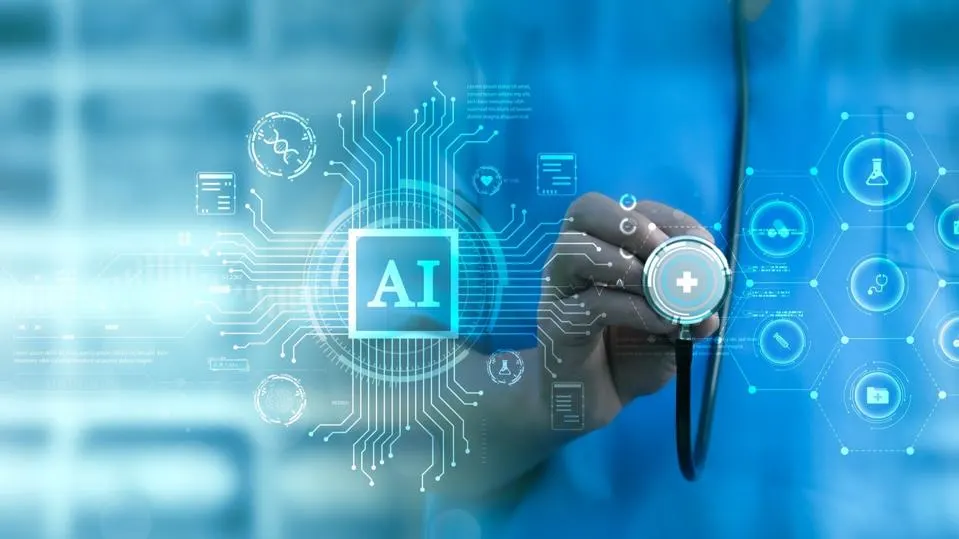How Generative AI Will Change Jobs In Healthcare
3 June 2024
Generative AI has the potential to change the way professionals work in every industry. In healthcare, it is set to revolutionize the way we diagnose and treat diseases, research new medicines and therapies, and manage routine administrative tasks.
Of course, AI will never replace the experience, skills and human touch of doctors and nurses. Instead, it will let them augment their abilities and expertise with super-fast insights and analysis. It can also relieve them of many of the time-consuming and routine tasks that prevent them from spending time with patients and directly improving outcomes.
Healthcare jobs are changing, and whether you are involved in delivering frontline care, developing new treatments or managing resources and infrastructure, understanding the opportunities and challenges is essential.
So, in this article, I will outline some of the exciting possibilities that generative AI brings to the table for healthcare professionals, as well as some of the challenges they will face as their roles evolve.

Generative AI In Diagnosis And Treatment
Generative AI will assist doctors and other frontline medical staff in diagnosing patients, thanks to its ability to analyze complex and disparate datasets including medical images and patient notes. Image recognition algorithms can scan x-rays, ultrasounds, MRI and CT scans, with numerous studies now emerging that show they can be as accurate as human experts at doing this. Generative AI then translates the output into human language that can even be personalized for individual specialists involved in treating the patient.
Before long, it is likely that we will see it producing personalized treatment programs, identifying specific treatments, medicines and therapies that are most likely to be effective for individuals.
Chatbots powered by generative AI will act as virtual medical assistants, providing triage and gathering patient data, as well as identifying the best human medical professionals to refer patients to. They will also provide specialist and personalized advice; for example, the OneRemission chatbot is programmed to help cancer patients through their recovery by offering diet and lifestyle advice, while Youper is designed to offer advice on mental health.
And it will help healthcare professionals to monitor the wellbeing of patients by providing a narrative around data streams generated by wearable devices and remote monitoring tools, either in hospital or home settings. This will provide early warning signs if a patient’s condition is deteriorating, or alert carers in the case of situations such as an elderly person suffering a fall.
Research And Development
Generative AI is already accelerating the process of discovering new drugs. For example, UK biotech firm Etcembly recently created the first immunotherapy drug for patients that was designed with the help of generative AI.
By generating hundreds of millions of genetic codes for T-cell receptors, scientists were able to complete research that would usually have taken many years in just a few weeks.
As well as generating data in the form of words and pictures, as with generative tools like ChatGPT and Dall-E, algorithms can create synthetic candidates for drug trials. It can create candidates for molecular structures that may have desired effects such as binding to specific receptors, or inhibiting enzyme production, and simulate tests to determine their likely real-world effects.
It can also suggest where drugs previously developed for other conditions might be repurposed to treat specific illnesses, as has been shown by this study into potential treatments for Alzheimer’s disease.
Generative AI algorithms are also being used to simulate human physiological responses to drugs, creating ethical alternatives to human or animal testing.
Overall, generative AI is already showing remarkable potential for helping researchers and chemists formulate and test new drugs, and we can expect to see it playing an increasingly important role in this field in the near future.
Ethical Implications
Although generative AI offers huge potential for improving patient outcomes and driving new frontiers of medical research, it also creates challenges around ethics and regulation.
Medical professionals, perhaps more so than any other professionals, will be required to understand issues around data, privacy and bias and how they might impact their roles.
Many of the use cases we’ve discussed here, particularly those involving personalization, will require access to highly sensitive and personal information. Healthcare professionals will need a comprehensive understanding of how this data can be securely and responsibly collected, processed and stored. They will also need to develop an awareness of when work can be delegated to AI and when a human touch is irreplaceable.
We can also expect that the use of AI, and particularly generative AI, in the healthcare sector will be subject to more stringent regulations than it might be elsewhere. Professionals will need to understand their own legal responsibilities and obligations. It will also be important to develop a thorough grounding in the principle of AI accountability and liability – after all, humans must always take ultimate responsibility for the provision of patient care. New, specialized roles are likely to emerge here, concerned with ensuring generative AI is only implemented in an ethical and accountable way.
Related Articles
Why Critical Thinking Is Your Best Weapon Against The Coming Deepfake Tsunami
By now, “smart” versions exist of just about every home appliance, gadget and gizmos we can think of. However, manufacturers continue[...]
5 AI Prompts That Will Transform Your Writing Forever
By now, “smart” versions exist of just about every home appliance, gadget and gizmos we can think of. However, manufacturers continue[...]
5 Mistakes Companies Will Make This Year With Cybersecurity
By now, “smart” versions exist of just about every home appliance, gadget and gizmos we can think of. However, manufacturers continue[...]
Bridging The AI Divide: Why Europe’s AI Future Depends On Transformative Innovation
By now, “smart” versions exist of just about every home appliance, gadget and gizmos we can think of. However, manufacturers continue[...]
Forget ChatGPT: Why AI Agents Are The Real Game-Changer For Financial Services
By now, “smart” versions exist of just about every home appliance, gadget and gizmos we can think of. However, manufacturers continue[...]
Agentic AI Enters Management: Taco Bell’s Byte-Sized Approach To Virtual Restaurant Leadership
By now, “smart” versions exist of just about every home appliance, gadget and gizmos we can think of. However, manufacturers continue[...]
Sign up to Stay in Touch!
Bernard Marr is a world-renowned futurist, influencer and thought leader in the fields of business and technology, with a passion for using technology for the good of humanity.
He is a best-selling author of over 20 books, writes a regular column for Forbes and advises and coaches many of the world’s best-known organisations.
He has a combined following of 4 million people across his social media channels and newsletters and was ranked by LinkedIn as one of the top 5 business influencers in the world.
Bernard’s latest book is ‘Generative AI in Practice’.










Social Media